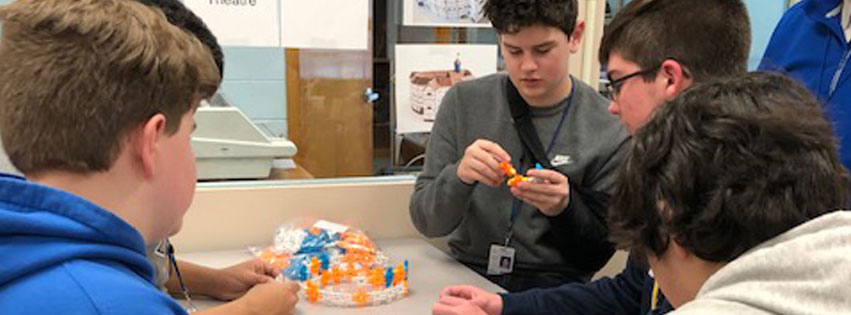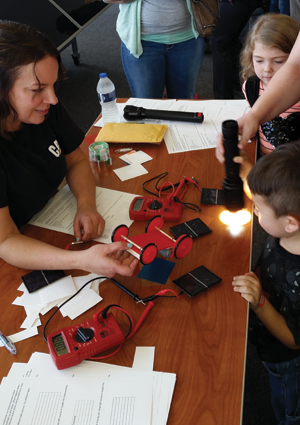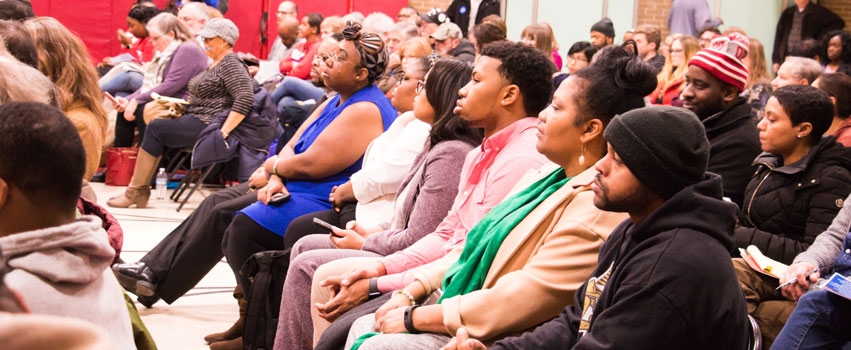Libraries Support STEM Education

As the STEM movement highlights the need for more student education around science, technology, engineering and math, Peoria-area libraries have offered their support. From hosting STEM workshops to creating makerspaces and lending STEM materials, local libraries of all types play an important role in STEM education.
Public Libraries
Summer is a great time to keep kids engaged in STEM through public library programs. The Peoria Public Library (PPL) offers classes such as Introduction to Scratch, on computer programming; Front & Center Let’s Do Math, a grade-school math tutoring program; and Scrumptious Science: Donuts, a workshop in which participants celebrate National Donut Day by learning the science behind donuts. Public libraries also offer a wide range of books on STEM-related topics for ages pre-school and up. Emma Roth from the PPL’s North Branch said they recently made a science book display, “and we’ve had to refill it daily to keep our young scientists happy.” You can find information on PPL’s STEM activities, as well as other area public libraries, by visiting their websites or stopping by in person.
School Libraries
Limestone Community High School librarian Jennifer Campbell says that her library serves as a hub for all learning, which includes hosting a makerspace called the STEM room. Like all makerspaces, it is a collaborative place for making, learning and exploring. Its no-boundaries atmosphere allows students to “not only learn new knowledge, but become more curious about concepts.” Several Limestone teachers have put the STEM room to use. A business teacher offered coding activities using Bloxels, a history teacher created stations that introduced new and review units, and an English teacher created stations for several required texts. The room, open to all students, offers a hands-on way to reinforce STEM concepts learned in the classroom. “We understand that students need hands-on experience to retain what they learn,” Campbell explains, “and a STEM room provides that opportunity.”

Academic Libraries
Academic libraries support faculty and students in STEM-related career fields at colleges and universities. Michelle Nielsen Ott of Methodist College explains that her library helps educate healthcare workers by teaching things like how to perform scientific research and the evidence-based practice model of hierarchy. The Methodist library offers students a place to study and work as a group, and includes models of bones and muscles for anatomy and physiology students. It also holds books on workforce preparation, nursing and medical exam practice guides, and a database that helps students take practice exams and create resumes. “My role in an academic library supporting a health sciences college means making sure that students, faculty and staff have access to the information they need,” says Ott.
Special Libraries
Special libraries are focused around a certain subject or group of users. The Technical Information Center at Caterpillar Inc. is an engineering library, offering research and knowledge management services to the firm’s engineering and technical community. The Caterpillar library also has a collection of STEM materials employees can borrow, including resources like robots and electronics education toys. Groups within Caterpillar, such as the Society of Women Engineers (SWE), can use these items for outreach events, and employees can borrow them to reinforce STEM at home with their children. The Caterpillar library also hosts student groups, teaching them how engineers use library skills in the workplace. “We like to let students know that the library and information skills they learn in school can be used as part of their future jobs,” notes Caterpillar librarian Laura Turner.
Rails Library
RAILS, or Reaching Across Illinois Library Systems, is a regional consortium that supports member libraries and enhances area STEM efforts. “We use our communication vehicles to help libraries share best practices and ideas for programs and services so other libraries can emulate,” explains RAILS communication director Mary Witt. “Libraries might not otherwise learn of these opportunities.” RAILS also provides training to local librarians, such as hosting a STEM workshop by the Fermi National Accelerator Laboratory at the Alpha Park Public Library, and offers grants to libraries for building STEM programs. The Morton Public Library, Morton School District 709 Library and Caterpillar Inc. Technical Information Center recently received a microgrant to develop circulating STEM kits together. PM
This article was a collaboration among librarians Emma Roth, Peoria Public Library; Jennifer Campbell, Limestone Community High School; Michelle Nielsen Ott, Methodist College; and Laura Turner, Caterpillar Technical Information Center.
